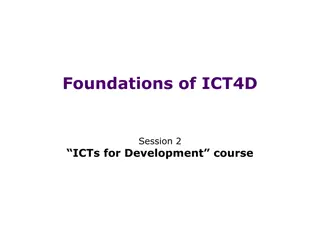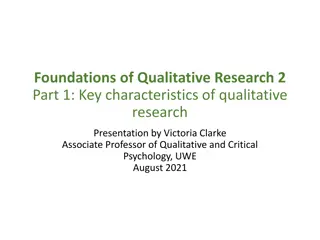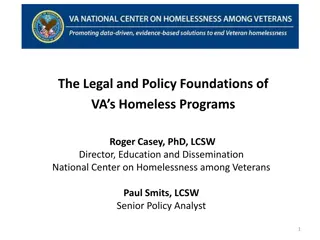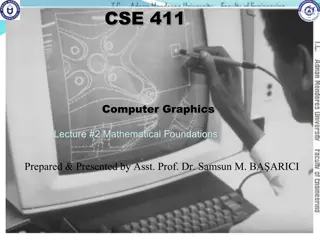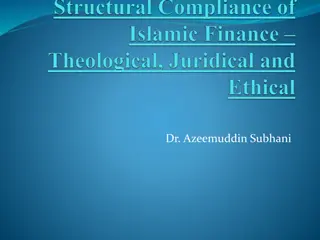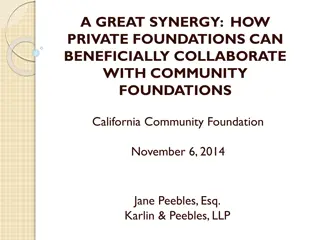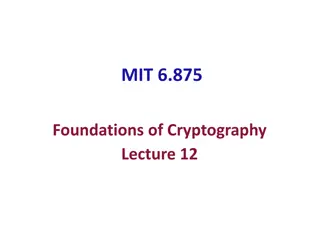
Foundations of Public Policy, Welfare State, and Critiques
Explore the philosophical and intellectual underpinnings of public policy and the welfare state, delving into economic, philosophical, and critical perspectives. Learn about the economic foundations of welfare economics, philosophical justifications for the welfare state, and differing critiques from neoliberal, social democratic, and conservative viewpoints.
Download Presentation

Please find below an Image/Link to download the presentation.
The content on the website is provided AS IS for your information and personal use only. It may not be sold, licensed, or shared on other websites without obtaining consent from the author. If you encounter any issues during the download, it is possible that the publisher has removed the file from their server.
You are allowed to download the files provided on this website for personal or commercial use, subject to the condition that they are used lawfully. All files are the property of their respective owners.
The content on the website is provided AS IS for your information and personal use only. It may not be sold, licensed, or shared on other websites without obtaining consent from the author.
E N D
Presentation Transcript
Maatschappij, Beleid en Evaluatie Tim Goedem tim.goedeme@uantwerpen.be Les 2 6/10/2015
Lecture 2 The philosophical and intellectual foundations of public policy & the welfare state 1. (Economic foundations) 2. Philosophical foundations 3. Intellectual roots of the welfare state 4. Recent critiques of the welfare state
Main questions How can we justify the welfare state? In which type of philosophical theory can common economic defences of the welfare state be situated? In which philosophical tradition would you place yourself? Why? In which ways do neoliberal, social democratic and conservative critiques of the welfare state differ? Explain main tenets of
Background texts Barr, N. (2012), Economics of the welfare state, Oxford: Oxford University Press, Chapter 2, p. 22-40 [compulsory] Pierson, C., and Leimgruber, M. (2010), 'Intellectual roots', in Castles, F. G., Leibfried, S., Lewis, J., Obinger, H. and Pierson, C. (eds.), The Oxford Handbook of the welfare state, Oxford: Oxford University Press, pp. 32-44. [background read] King, D., and Ross, F. (2010), 'Critics and beyond', in Castles, F. G., Leibfried, S., Lewis, J., Obinger, H. and Pierson, C. (eds.), The Oxford Handbook of the welfare state, Oxford: Oxford University Press, pp. 45-57. [compulsory] http://www.justiceharvard.org/ Michael J. Sandel (2009) Justice [background].
Part 1: Economic foundations First-best economy: Perfect competition (price taker, equal power) No externalities, no public goods, or increasing returns to scale Public good: non-rivalness in consumption, non-excludability, non- rejectability Perfect information (of buyers and sellers, about quality, price and future) Maximizing behaviour (vs. bounded rationality & bounded will- power) Complete markets No distortionary taxation (changing behaviour)
1. Economic foundations Two fundamental theorems of welfare economics (Barr, 2012) First-best economy can reach efficiency objective It is possible to achieve a given income distribution without interfering with market allocation, other than transferring resources When markets fail => government intervention is required for achieving efficiency and equity objectives
Part 2: philosophical foundations Philosophy and public policy What is a proper role for the state? Focus on different conceptions of social justice Sets of philosophical theories
Runaway trolley (Sandel, 2009) In trolley 1-5 persons on track Onlooker bridge heavy man Save lives Freedom Virtue Intention
Society Social justice and role of state traditionally discussed within the context of a single society What is a society?
Society Bentham: community is a fictitious body Barr A society is a cooperative venture for the mutual benefit of its members Contrast this with: a system of interrelationships connecting individuals together in a particular territory, while making them subject to a common system of political authority and dominant cultural expectations Societies can be multi-layered, plural and characterised by exploitation of some groups by others Boundaries of society & Methodological nationalism
Just Society Just society (Sandel, 2009: 19) = distributes the things we value in the right way income & wealth, duties and rights, powers and opportunities, offices and honours gives each person his/her due What are people due, and why? Purpose of theories of society / social justice: Offer principles that enable us to choose between different social arrangements
Types of (recent) theories (Barr) Natural- rights Freedom Libertarian Empirical Utilitarian Liberal Welfare Egalitarian Democratic socialism Need Collectivist Marxism
Types of theories (Sandel) Laissez- fair Libertarian Freedom Liberal egalitarianism Fairness Welfare utilitarianism Good life Virtue Kant Desert Aristotle Purpose
Liberal theories Maximise welfare utilitarian Social contract egalitarian Commonalities: Analyse society in terms of individual members Private property explicitly not as end in itself, but as means toward policy goals Contain principle of distribution
Liberal theories Commonalities (cont d) Capitalism is more efficient than any other system in creating welfare (or utility) It has major costs in terms of poverty and inequality (and the environment) Government can ameliorate those costs
Utilitarianism Purpose: maximise utility Utility: individual well-being, or satisfaction, or happiness, overall balance of pleasure and pain How: make sure production and allocation of goods is efficient Allocation is equitable Equity assessed on the basis of marginal utility Jeremy Bentham
Utilitarianism Equal distribution of incomes justified if: Everyone identical marginal utility of income Utility of everyone can be measured cardinally
Utilitarianism More generally: Cost benefit analysis But only principle is maximisation of total welfare Only consequences determine what is the right thing to do, not the intention, duties, rights or anything else
Utilitarianism Policy implications: Production and allocation by state or market, whichever is most efficient in maximising utility Criticisms: No respect for individual freedom / individual rights if total utility increases, no concern with interpersonal distribution
Utilitarianism Policy implications: Production and allocation by state or market, whichever is most efficient in maximising utility Criticisms: No respect for individual freedom / individual rights if total utility increases, no concern with interpersonal distribution Impossibility of common currency of value (utility), weighing preferences without judging them The Cabin boy the ticking time bomb (terrorist daughter)
Libertarianism Against state intervention because: Morally wrong natural rights Reduces welfare empirical Commonalities: Analyse society in terms of individual members Heavy weight to individual freedom Strongly support private property and the market mechanism
Libertarianism: natural rights Starting point: Everyone has a fundamental right to liberty we own ourselves, including the rewards of our own labour Right to do whatever we want with the things we own, provided we respect other people s rights to do the same
Libertarianism: natural rights Self-ownership Taking Person Slavery Labour Forced labour Fruits of labour Theft / taxation Source: Sandel, 2009: 66.
Libertarianism: natural rights Example: Robert Nozick (Anarchy, State and Utopia, 1974) Distributive justice depends on : Justice in initial holdings: were resources used to make money legitimately yours? Justice in transfers: did you acquire your wealth through free exchange, or gifts voluntarily bestowed upon you by others? and nothing else. Other holdings: illegal, may be redistributed by government (justice in rectification) What matters is how the distribution came about, not the result
Natural-rights libertarianism: Policy implications Role of state: the defence of our person and property Enforce contracts Protect private property Keep the peace Other implications No paternalism (no need to protect people against themselves, e.g. seat belt) No morals legislation (e.g. prostitution, homosexuality) No redistribution of income or wealth (Taxation as theft and slavery) Nightwatchman state
Libertarianism: natural rights Example: Michael Jordan Start with just distribution Basketball games & voluntary exchange Final distribution: what s wrong with it? Nothing.
Empirical libertarianism Against state intervention because: Morally wrong natural rights Reduces welfare empirical Empirical libertarians (Hayek, Friedman): Essentially the same, but mix with utilitarian arguments: the market is a neutral force, with the best capacity to maximise welfare and guarantee freedom Importance of poverty relief, and provision of some public goods
Assignment Role game, groups of six rational people, knowledge of the world, don t know one another, realistic degree of self- interest All with partner and two children Rich Powerful (armed) General practitioner Merchant Blue-collar worker Low-skilled unemployed, dependent upon others for survival Discuss who cleans up asbestos / nuclear waste of Fukushima in the coming 30 years Second step: same, but you don t know in which position you will end up
Liberal theories Main organising principle for society: Maximise welfare utilitarian Social contract egalitarian Commonalities: Analyse society in terms of individual members Private property explicitly not as end in itself, but as means toward policy goals Contain principle of distribution
Liberal egalitarianism: John Rawls Starting point: social contract between free, rational, self-interested individuals who negotiate principles organising society Veil of ignorance: knowledge about the world, but not about themselves No one with superior bargaining power or knowledge = among equals: the principles we would agree to, would be just, fair (justice as fairness) Self-interested: reject each principle that could lead to systematically less privileges for any person / group
Liberal egalitarianism: Rawls The liberty principle (Rawls, 1972: 60) Each person is to have an equal right to the most extensive basic liberty compatible with a similar liberty for others (e.g. freedom thought, speech, religion, ) The difference principle: maximin (Rawls, 1972: 80) Social and economic inequalities are to be arranged so that they are both: to the greatest benefit of the least advantaged, and attached to offices and positions open to all under conditions of fair equality of opportunity Only those inequalities that benefit the least advantaged The priority principle (liberty first)
Liberal egalitarianism: Rawls More generally: distribution of income and opportunities should not be based on factors that are arbitrary from a moral point of view (Sandel, 2009: 153), e.g. birth Natural distribution of abilities and talents Social and economic advantage of context Would John Rawls favour a meritocratic society? Why (not)?
Liberal egalitarianism: Rawls Criticisms Incentives through inequality: allowed, but only insofar to the benefit of the poorest Rewarding talent & effort: is effort a contingency for which we can claim credit? No: also result of talent & environment No: qualities that a society happens to value at any given time is also morally arbitrary Desert vs. entitlement Not egalitarian nightmare: let talents flourish, but benefits are for community
Liberal egalitarianism: Rawls Criticisms Veil of ignorance is completely unrealistic Liberty principle: not sufficiently justified Priority principle: sometimes poor people may want to trade some liberty for economic improvement General theory is not possible, social justice involves (conflicting claims of) rights, desert & need (and ), Rawls blend these together to a vague whole
Collectivist theories Dominant economic system Social democrats Capitalist Communist Marxists Commonalities: Analyse society (also) in terms of groups (classes) Private property not goal in itself Important role for the state and strong concern with equality Need as a basic claim for social justice
Marxism Starting point (George, 2012): Freedom is fundamental Human nature fulfils itself through free labour Creativeness of human beings can only be fulfilled in a society where they can decide for themselves the kind of jobs that they enjoy doing Human beings are by nature creative, freedom-loving, and considerate of others Freedom is defined positively: it requires political, economic and social rights, freedom to fulfil abilities and talents
Marxism Capitalist drive for profitability increasingly results in Technological innovation, and division of labour => alienation & destruction of concern for others Affects equally employers, due to competition for survival Exploitation of labour power to the greatest possible extent => impoverishment to level of subsistence wage given that labourer, deprived of other sources of income, is not free to offer labour to employers By abolishing private ownership of means of production and division of labour, alienation can be overcome Every social system contains the seeds of its own destruction Reform where possible, revolution where necessary





